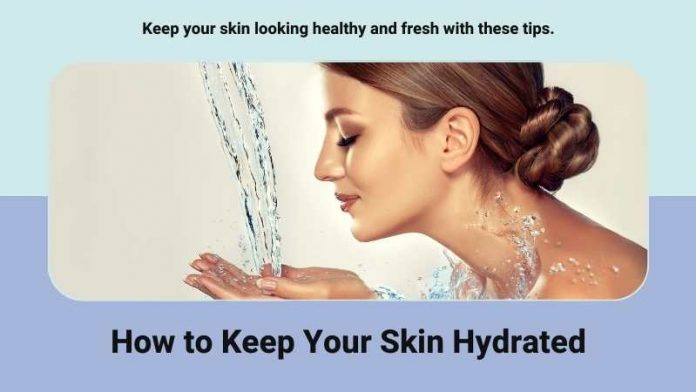You will agree that achieving healthy and radiant skin is your ultimate beauty aim. The significance of skin hydration should not be overlooked, as it plays a vital role in enhancing your skin’s appearance and overall health. With a better understanding of the science behind the hydration of your skin, you will be able to achieve and maintain healthy and well-hydrated skin free from flaws. Read on to learn about the tips to maintain skin hydration, diet and professional treatments to enhance and maintain hydration levels, and ways to protect skin from external dehydrating factors.
Science Behind Skin Hydration
Your skin comprises three different layers: the hypodermis, dermis, and epidermis. The epidermis, or the topmost skin layer, is your natural barrier to retain moisture and shield against the effects of external factors. The epidermis layer also includes the protective properties of ceramides [1] and lipids forming a barrier with waterproof ability to lock in essential moisture and flushing out toxic elements [2]. Your skin also has unique water channels [3] called aquaporins [4], which regulate the water molecules’ movement in your skin layers to keep it hydrated [5].
The water evaporation of the skin layers is called TEWL or Transepidermal Water Loss [6], this evaporation is curbed by the presence of hydrolipidic film on the epidermis. If this physiological barrier is damaged, the process of TEWL paces up and makes the skin dry [7]. So, the dermis will not circulate water to your epidermis layer, as the hydrolipid film stops its function. This, in turn, leads to skin dehydration. If you wish to flaunt healthy and young-looking skin, keeping your skin hydrated will help it look plump and smooth. With well-hydrated skin, you can keep dullness, flakiness, and dryness at bay and lower the appearance of signs of ageing like wrinkles or fine lines.
About Skin Hydration
Any skin, combination, dry, or oily will experience dehydration. The effects of dehydration will be much more visible in dry skin and less visible in other skin types. Hydrated skin looks smooth and plump with a natural glow when it has enough water to optimize its strength. A well-hydrated skin doesn’t have a flaky texture and will not give an uncomfortable, tight, or rough feeling soon after a shower. You can check the hydration level of your skin by just pinching it with two fingers to check whether it settles back instantly, indicating it is hydrated.
Several external and internal factors can affect your skin’s hydration levels. Internal factors like changes in hormones, genetics, and age will influence and cut down your skin’s ability to lock in moisture. With age, your skin loses its oil production and moisture retention ability, causing your skin to appear dull, dry, and tired. Monthly menstrual cycles [8], menopause, and pregnancy will also have a huge effect on your skin hydration levels due to changes in hormone levels [9].
Your skin will be dehydrated due to external factors like extremely dry weather, harsh winter, consumption of alcohol, too much caffeine and taking hot showers regularly. All these factors can deprive your skin of hydration and can affect your skin health, making it look dull and lifeless. Apart from consuming enough water [10], skin hydration can be achieved through a nourishing skincare regime and conscious lifestyle practices.
Top 6 Signs of Dehydrated Skin
People tend to need clarification about the difference between dry skin and dehydrated skin. Dry skin can’t hold moisture due to the absence of natural oils, which might cause it to crack, flake, and bleed. Dehydrated skin indicates that your skin doesn’t have enough moisture to maintain its suppleness [11]. As the skin layers require moisture to perform their functions, skin that is not hydrated with enough water will not be able to stretch or stay protected against infections. Keep reading to learn more about some of the 6 best signs that indicate your skin is not hydrated.
1. Dull-looking Skin
If you feel that your skin looks flat and lifeless, then it indicates that you have dehydrated skin. When your skin lacks moisture, it will not impart a natural shine or a healthy radiance, making it look dull and lifeless. Dehydration prevents your skin from performing its usual functions, such as cell turnover. As the dead cells are not eliminated, they accumulate and clog pores to cause skin infections.
2. Itchy Skin
Have you been having itchy skin lately without any allergies or rashes? Dehydrated skin can be itchy, as it will develop superficial cracks through which bacterial infection might develop, leading to itchiness.
3. Dark Circles Under Eyes
If you notice dark circles under your eyes despite sleeping well at night and limiting screen time, it shows that your skin lacks water. You might also notice that the skin surrounding your eyes looks pulled away from the eye sockets, causing a sunken look.
4. Appearance of Fine Wrinkles
Though wrinkle formation is a part of ageing, genetics, and exposure to the sun, the development of very fine wrinkles within a short period is due to skin dehydration. Unlike your laugh lines or crow’s feet, these fine wrinkles are triangular and can be easily identified. Keeping your skin moisturized and drinking adequate water will fade these fine wrinkles and make your skin look plumper.
5. Eye Bags
When your skin is dehydrated, it cannot stretch and lose its elasticity. So, the loose skin under your eyes gathers together to form bags.
6. High Sensitivity
One of the noticeable signs of skin dehydration is increased sensitivity. When there is a disruption in the moisture barrier on your skin, it will not be able to protect against external factors like environmental stressors. So, pollutants, dust and bacteria will enter the epidermis to cause irritation, inflammation, and reddishness.
Daily Hydration Tips
If you are keen on enhancing the hydration levels of your skin, then following a few strategies will help in improving and maintaining it [12].
1. Hydration from Inside
To enhance skin hydration, paying attention to improvising it from within is essential. Make sure that your water intake every day is adequate to avoid constant dehydration [13]. Drink around 8 glasses of water per day to get healthy and supple skin. Studies have revealed that drinking the recommended amount of water will be beneficial for hydrating your skin, as it improves the dermal layer [14]. Apart from water, including fresh fruit juices without any added sugar to nourish from within.
2. Topical Products for Optimal Hydration
Choosing the right type of skincare product will help in achieving maximum hydration. Use gentle cleansers, hydrating face creams, nourishing face masks, and high-quality moisturizers with ceramide, hyaluronic acid, or glycerin to keep in moisture [15]. Ensure the moisturizer is applied to damp skin after your shower to enhance its nourishing effect. You can stock on skin hydrating serums, creams and masks with AHAs or alpha hydroxyl acids, niacinamide, Shea butter, jojoba oil, or olive oil to boost hydration levels [16].
3. Invest in a Humidifier
Humidifiers are designed to enhance moisture levels in the air inside your room to prevent your skin from drying out and becoming dehydrated. When you stay in a room with high moisture content for long hours, your skin retains hydration and becomes softer and suppler.
4. Avoid Hot Showers
Though hot showers can sound tempting after a tiring day at work, hot water can cause depletion of skin moisture, leading to dehydration. When you take hot showers regularly, the hot water temperature will cause dehydration in the epidermis layer and damage skin health. If you live in a cold region where taking a shower in cold water is impossible, use warm water for a bath and finish off by rinsing your face and body with cold water to close the open skin pores.
5. Use Sleep Mask Regularly
Your skin is highly permeable as you go into the night. Firstly, it indicates that your skin will lose its moisture quickly and the water content will evaporate due to the TEWL or Transepidermal Water Loss phenomenon. However, it indicates active ingredients can penetrate your skin easily and work wonders on your epidermis. So, using sheet masks with potent actives will be beneficial to revive dull and dry skin. These sleep masks are formulated with hydrating ingredients like fatty acids or antioxidants in concentrated form to fuse into your skin layers for conditioning and nourishing the skin.
6. Improve Lifestyle Habits
Regular workouts will help increase blood circulation and nourish your skin, giving it a hydrated look. Managing your stress levels with yoga practice, breathing exercises, and meditation is essential to prevent skin dehydration. Also, ensure you sleep for sufficient hours, which will help enhance skin hydration levels and improve your overall health.
7. Diet and Hydration
Diet plays a critical role in improving the strength of your skin and its ability to lock in moisture. Consuming foods loaded with essential fatty acids and omega-3 fatty acids [17] like olive oil, salmon [18], flaxseeds, and walnuts will help in maintaining skin hydration [19]. Germany’s Institute of Experimental Dermatology showed that women who consumed flaxseed oil supplements for 12 weeks felt improved hydration and a low amount of skin roughness [20].
Professional Hydration Treatments
Despite following skin hydrating practices and tips, you might experience moisture loss when running your fingers across the skin. You can opt for professional skin hydrating treatments to replenish the lost moisture and optimize skin health.
Laser Therapy
Though laser therapy might not help hydrate your skin, this treatment will be useful to eliminate dead skin cells, improve collagen production, and lower fine lines and wrinkles. Laser treatment uses concentrated light energy to penetrate the deep skin layers and remove the uppermost skin layer to keep it supple and young.
Chemical Peels
Chemical peels are ideal for exfoliating dead skin and improving skin complexion. These peels focus on improving hydration, texture, and tone for better absorption of skin-nourishing products. These chemical peels will kindle collagen production and facilitate better skin cell growth.
Derma Fillers
Derma fillers are a perfect option to keep your skin hydrated and enjoy its benefits in the long run. These fillers use skin-nourishing hyaluronic acid to nourish the skin layers and reduce the signs of ageing caused by dehydration. This procedure injects hyaluronic acid into your skin, which bonds and stores water to release it later to the tissues and cells to nourish it.
Mesotherapy
This procedure is performed by injecting skin-friendly minerals and nutrients using ultrafine needles to replenish the lost moisture. These nutrients penetrate the layers of your skin to offer the right amount of hydration and nourishment to replace the lost moisture.
Protecting Skin from Dehydrating Factors
Protection from External Factors
Several external factors like UV ray exposure, humidity, and climate will have a drastic effect on the hydration level of your skin [21]. Low humidity and extreme temperatures will dehydrate your skin, and exposure to sun rays might cause severe damage to the natural moisture barrier and cause photos and sunburns. Choose a broad-spectrum sunscreen [22] to protect your skin from the harmful effects of UV rays. Other skincare products have effective ingredients like glycerin, ceramides, and hyaluronic acid to keep moisture levels intact and maintain hydrated and healthy skin. Minimizing your skin exposure to moisture-depleting factors like too much sun exposure, low humidity, harsh winter, high altitude, and strong winds will help prevent the loss of natural oils.
Protection against Harsh Skin Products
If your current skincare product has harsh chemicals, then it might strip your skin of natural oils and cause an imbalance in the pH level [23]. Opting for skin products with gentle formulations will help protect the skin barrier while eliminating accumulated dirt and debris. You can also use micellar water with natural ingredients to help remove traces of makeup, sweat and grime effectively. Avoid products that contain harsh ingredients like added fragrances, alcohol, and sulphates to prevent them from dehydrating your skin.
Concluding Thoughts
Maintaining a consistent skincare routine and following the skin nourishing tips discussed above are essential for improving hydration levels. You can also choose gentle hydrating products and use sunscreen that is customized with effective ingredients to achieve glowing and hydrated skin. Always remember that to flaunt well-hydrated skin, it is essential to take care of the skin externally and internally. Once you realize the significance of skin hydration, don’t hesitate to take the first step towards protecting it against external factors and cure it internally by making small lifestyle changes. With the right professional treatment from Kolors Healthcare, patience, and consistency, achieving and maintaining amazingly nourished skin is just within your reach.
References
- Luisa Coderch 1, Olga López, Alfonso de la Maza, José L Parra: Instituto de Investigaciones Químicas y Ambientales de Barcelona, Barcelona, Spain – https://pubmed.ncbi.nlm.nih.gov/12553851/
- Barbora Školová, Barbora Janůšová, Jarmila Zbytovská: Charles University in Prague, Faculty of Pharmacy, Heyrovského 1203, 50005 Hradec Králové, Czech Republic – https://pubs.acs.org/doi/10.1021/la4037474
- Kazuyuki Kitatani, Academic Editor and Nawajes Mandal, Academic Editor: Department of Pharmacology, Division of Pathological Sciences, Kyoto Pharmaceutical University, Kyoto – https://www.ncbi.nlm.nih.gov/pmc/articles/PMC8468445/
- M. Boury-Jamot a, R. Sougrat a 1, M. Tailhardat b, B. Le Varlet b, F. Bonté: Service de Biophysique des fonctions membranaires, DBJC/SBFM, Bâtiment 532, CEA/Saclay, F-91191 Gif-sur-Yvette, Cedex, France – https://www.sciencedirect.com/
- Bollag, W. B., Aitkens, L., White, J., & Hyndman, K. A. (2020). Aquaporin-3 in the epidermis: More than skin deep. American Journal of Physiology – Cell Physiology, 318(6), C1144. https://doi.org/10.1152/ajpcell.00075.2020 – https://www.ncbi.nlm.nih.gov/pmc/articles/PMC7311736/
- Green, M., Kashetsky, N., Feschuk, A., & Maibach, H. I. (2022). Transepidermal water loss (TEWL): Environment and pollution—A systematic review. Skin Health and Disease, 2(2) – https://www.ncbi.nlm.nih.gov/pmc/articles/PMC9168018/
- Helen Alexander, Sara Brown, Simon Danby, Carsten Flohr: Unit for Population-Based Dermatology Research, St John’s Institute of Dermatology, Guy’s and St Thomas’ NHS Foundation Trust and King’s College London, London, UK – https://pubmed.ncbi.nlm.nih.gov/30348333/
- Gabrielle E. W. Giersch, Nisha Charkoudian, Rebecca L. Stearns1, Douglas J. Casa: Korey Stringer Institute, University of Connecticut, Storrs, CT, USA – https://www.esi.academy
- Gennev: virtual medical clinic for women in menopause – https://www.gennev.com/education/menopause-and-dehydration
- Palma, L., Marques, L. T., Bujan, J., & Rodrigues, L. M. (2015). Dietary water affects human skin hydration and biomechanics. Clinical, Cosmetic and Investigational Dermatology – https://www.ncbi.nlm.nih.gov/pmc/articles/PMC4529263/
- Healthdirect Australia – https://www.healthdirect.gov.au/dehydration
- Hodges, A. L., & Walker, D. K. (2016). Skin Care for Women. Nursing for Women’s Health – https://www.sciencedirect.com/science/article/abs/pii/S175148511630277X?via%3Dihub
- Palma L, Tavares Marques L, Bujan J: https://doi.org/10.2147/CCID.S86822 – https://www.dovepress.com
- Lídia Palma, Liliana Tavares Marques, Julia Bujan: CBIOS – Research Center for Health Science and Technologies, Universidade Lusófona, Campo Grande, Lisboa, Portugal – https://www.ncbi.nlm.nih.gov/pmc/articles/PMC4529263/
- Lodén, M. Role of Topical Emollients and Moisturizers in the Treatment of Dry Skin Barrier Disorders. Am J Clin Dermatol 4, 771–788 (2003). https://doi.org/10.2165/00128071-200304110-00005 – https://link.springer.com/article/10.2165/00128071-200304110-00005
- Spada F , Barnes TM, Greive KA: https://doi.org/10.2147/CCID.S177697 – https://www.dovepress.com/
- Sawada, Y., Saito-Sasaki, N., & Nakamura, M. (2020). Omega 3 Fatty Acid and Skin Diseases. Frontiers in Immunology, 11. https://doi.org/10.3389/fimmu.2020.623052 – https://www.ncbi.nlm.nih.gov/pmc/articles/PMC7892455/
- Meng, F., Qiu, J., Chen, H., Shi, X., Yin, M., Zhu, M., & Yang, G. (2021). Dietary supplementation with N‐3 polyunsaturated fatty acid‐enriched fish oil promotes wound healing after ultraviolet B‐induced sunburn in mice. Food Science & Nutrition, 9(7), 3693-3700. https://doi.org/10.1002/fsn3.2330 – https://www.ncbi.nlm.nih.gov/pmc/articles/PMC8269668/
- Parke, M. A., Perez-Sanchez, A., Zamil, D. H., & Katta, R. (2020). Diet and Skin Barrier: The Role of Dietary Interventions on Skin Barrier Function. Dermatology Practical & Conceptual, 11(1). https://doi.org/10.5826/dpc.1101a132 – https://www.ncbi.nlm.nih.gov/pmc/articles/PMC7875671/
- Liska, D., Mah, E., Brisbois, T., Barrios, P. L., Baker, L. B., & Spriet, L. L. (2018). Narrative Review of Hydration and Selected Health Outcomes in the General Population. Nutrients, 11(1), 70. https://doi.org/10.3390/nu11010070 – https://www.mdpi.com/2072-6643/11/1/70
- Engebretsen, K. A., Johansen, J. D., Kezic, S., Linneberg, A., & Thyssen, J. P. (2016). The effect of environmental humidity and temperature on skin barrier function and dermatitis. Journal of the European Academy of Dermatology and Venereology, 30(2), 223-249. https://doi.org/10.1111/jdv.13301 – https://onlinelibrary.wiley.com/doi/10.1111/jdv.13301
- Geoffrey, K., Mwangi, A., & Maru, S. (2019). Sunscreen products: Rationale for use, formulation development and regulatory considerations. Saudi Pharmaceutical Journal, 27(7), 1009-1018. https://doi.org/10.1016/j.jsps.2019.08.003 – https://www.sciencedirect.com/science/article/pii/S1319016419301033?via%3Dihub
- Rodan + Fields, San Francisco, California – https://journals.lww.com/









